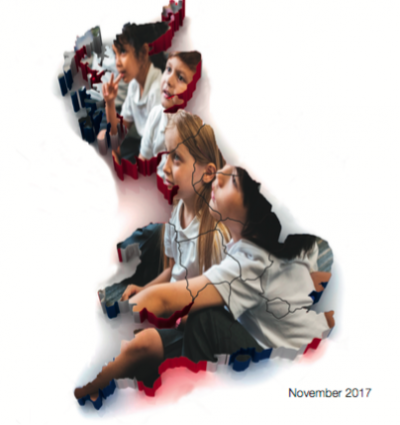The Social Mobility Commission has today launched the State of the Nation 2017, a review of social mobility in Great Britain.
The report assesses the progress that Great Britain has made towards improving social mobility, and ranks all English local authorities into hotspots and coldspots, using a range of 16 indicators for every life stage from the early years through to working lives.
Key findings:
Some parts of the country are far more conducive to social mobility than others:
- Disadvantaged children are 14 percentage points less likely to be school-ready at age five in coldspots than hotspots: in 94 areas, under half of disadvantaged children reach a good level of development at age five.
- 51 per cent of London children on free school meals achieve A* to C in English and maths GCSE, compared with an average of 36 per cent in all other English regions: in Westminster 63 per cent get good English and maths GCSEs, but in the Isle of Wight only 27 per cent do.
- In Kensington and Chelsea, 50 per cent of disadvantaged youngsters make it to university, but in Hastings, Barnsley and Eastbourne, the university participation rate for this group falls to just 10 per cent.
- One-quarter of young people are NEET (not in education, employment or training) in South Ribble compared with 1 per cent in North Hertfordshire.
- In 71 largely rural areas, over 30 per cent of people earn below the voluntary living wage: average wages in the worst-performing area, West Somerset, are £312 a week, less than half those in the best-performing areas of Wandsworth, Richmond upon Thames and Westminster.
- In Bolsover, just 17 per cent of residents are in professional and managerial occupations compared with 51 per cent in Oxford.
- In Blaby, Rochford and Harborough, 80 per cent of families own their home but in Tower Hamlets the gure is just 18 per cent.
“All too often the debate about social mobility becomes polarised between those who succumb to a weary sense of inevitability about our powerlessness to challenge the global forces that are reshaping the social landscape and those who subscribe to the theory that change can only happen if the whole global economic system is turned upside down. Both positions we believe to be counsels of despair. There is enough evidence from around the world, in our country’s own history and, contemporaneously, in local areas to know that, with the right approach, the transmission of disadvantage from one generation to the next can be broken”
Recommendations:
A series of recommendations are made, drawing on some of the best practice witnessed:
- Every local authority should develop an integrated strategy for improving disadvantaged children’s outcomes and that pupil premium funds should be invested in evidence-based practice.
- Local authorities should support collaboration between isolated schools, subsidise transport for disadvantaged young people in isolated areas and encourage Local Enterprise Partnerships to follow the North East Local Enterprise Partnership’s approach to improving careers support for young people.
- Local authorities should all become accredited living wage employers and encourage others in their communities to do likewise.
According to the report, none of this is to suggest that the answer to our country’s social mobility lottery lies purely in the hands of local communities. National governments have a leading role to play in tackling the local lottery in social mobility.
A number of special recommendations to the UK government are made:
- It should launch a fund to enable schools in rural and coastal areas to partner with other schools to boost attainment.
- Regional School Commissioners should be given responsibility to work with universities, schools and Teach First to ensure that there is a good supply of teachers in all parts of their regions.
- The Department for Business Energy & Industrial Strategy should match the Department for Education’s £72 million Opportunity Area fund to ensure that there is a collaborative e ort across local education systems and labour markets.
The Social Mobility Commission run an annual review of Social Mobility across Great Britain, you can find out more about the commission here.
NEXT STEPS:
- Read the State of the Nation here
- Explore our Careers Hub, an impartial look at careers of the future and ones you can do right now!
- No matter what the future holds young people need skills, read more about our free Young Professional Membership here







